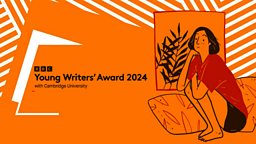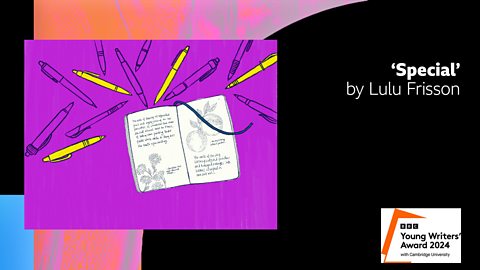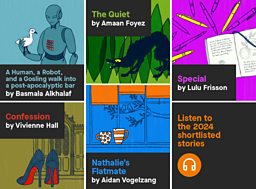The winner of the 2024 91Èȱ¬ Young Writers’ Award with Cambridge University has been announced!

Congratulations to Lulu Frisson, whose story, ‘Special’ was chosen by our judges as the winning entry of the 2024 91Èȱ¬ Young Writers’ Award with Cambridge University.
Chair of Judges Katie Thistleton revealed the winner in a ceremony live on 91Èȱ¬ Radio 4 on Tuesday 1 October, along with the winner of the National Short Story Award.
‘Special’ is a "beautifully crafted" portrayal of a neurodiverse student who is struggling at school until, introduced to the joys of reading and writing by an empathetic teacher, she discovers the power of creativity as a tool for self-discovery and undergoes a "profound change." You can hear the winning story here:

Special (91Èȱ¬ Young Writers' Award Winner 2024)
Written by Lulu Frisson, 17, from Birmingham.
Katie Thistleton says:
“I was so impressed by the quality of the shortlist for the Young Writers’ Award and the incredible skill displayed by writers of such a young age, but ‘Special’ really jumped out at me from the very first reading. It is such a beautifully crafted, richly poetic story which explores neurodiversity with empathy and originality. I felt as if I was on a journey with the protagonist and was cheering her along all the way! Lulu is a serious talent, and we can’t wait to see what she writes next.”
Lulu was joined at the ceremony by the four other shortlisted writers. You can listen to all the shortlisted stories through the links below.
‘A Human, a Robot and a Gosling Walk into a Post-Apocalyptic Bar’ by Basmala Alkhalaf, 17, from Birmingham
‘The Quiet’ by Amaan Foyez, 18, from Essex
‘Special’ by Lulu Frisson, 17, from Birmingham
‘Confession’ by Vivienne Hall, 17, from Bolton
‘Nathalie’s Flatmate’ by Aidan Vogelzang, 15, from Elgin, Scotland
Joining Katie on this year’s judging panel were author, broadcaster and former teacher Jeffrey Boakye; bestselling and award-winning children and YA author Katherine Webber; novelist Nicola Dinan; and award-winning children’s and YA author and journalist Benjamin Dean.
Of the winning story, Dr Elizabeth Rawlinson-Mills, University Associate Professor in the Faculty of Education and Fellow of Robinson College Cambridge, says: “It feels impossible to write about this story without using the word “special”. What a glorious celebration of reading, writing and the power of a transformative teacher. Lulu’s beautiful, powerful writing reminds us of the power of words and images to shrink the distances between us, and how urgent and life-changing that can be.”

About the 91Èȱ¬ Young Writers’ Award with Cambridge University
Now in its tenth year, the 91Èȱ¬ Young Writers’ Award with Cambridge University 2024 was open to all writers between the ages of 14 –18 and was created to discover and inspire the next generation of writers. It is a cross-network collaboration between 91Èȱ¬ Radio 4 and Radio 1. The winner will receive a personalised mentoring session with an author to enhance their writing skills.

More info on this year's shortlist

‘A Human, a Robot and a Gosling Walk into a Post-Apocalyptic Bar’ by Basmala Alkhalaf
A dystopian ‘laugh out loud funny’ story featuring a sardonic human and a robot who discover an orphaned gosling and have humorously contrasting reactions, exploring human greed, survival and the possibility that robots could be kinder than humans. Basmala was inspired by the idea that robots may outlast humans if the world ends, and by learning about Konrad Lorenz’s theory of imprinting in psychology class. Her writing was influenced by the work of Rick Riordan and Terry Pratchett.
Experimental in form and written in a style ‘between prose and poetry,’ this dark, contemporary retelling of Red Riding Hood explores control, suppression, fear and the importance of free speech. Set in a world controlled by a sinister higher power who have forbidden noise, a girl walking through the woods to visit her grandmother remains silent when she is attacked by a wolf and pays the ultimate price for her obedience. Written in response to a GCSE narrative prompt and inspired by Geoge Orwell’s 1984, Amaan intends the story to be a cautionary tale about extreme censorship.
A neurodiverse girl who is struggling at school is introduced to the joys of reading and writing by an empathetic teacher and undergoes a ‘profound change’ as she discovers the power of creativity as a tool for self-discovery, in this story inspired by personal experience. Told in the third person, this richly poetic ‘ode to books,’ exploring the true meaning of the word ‘special’ and the negative connotations around the language of neurodiversity was praised by the judges for its ‘confident writing.’ Although set against a background of education budget cuts, a lack of SEND provision in schools and the cultural stigmatisation of those with special needs, Lulu’s story is a call for empathy and a reminder of the beauty of human differences.
This dark, gothic story told with a ‘sense of foreboding’ from the viewpoint of a priest with a skewed sense of justice who selects a vulnerable visitor to his church to be the ultimate sacrifice, explores themes of faith, trust and exploitation. Inspired by the idea that trusted authority figures may not be all they seem to be,
Vivienne wrote the story during her Curriculum Enrichment Programme’s creative writing lessons at school, aiming to create a filmic drama she could envisage on the screen.
‘Nathalie’s Flatmate’ by Aidan Vogelzang
A ‘sophisticated’ and ‘genuinely funny’ story about the start of a new relationship and the fear of change as observed by a possessive cat. When sensible student Nathalie falls for a boy her cat deems unsuitable, the jealous cat is initially hostile, until the boy wins it over. Inspired by his own cat’s ‘general passive-aggressive antics’ Aidan wrote the story over a weekend on Google Docs, purposefully aiming for a light tone as a counterbalance to the depressing stories in the news.